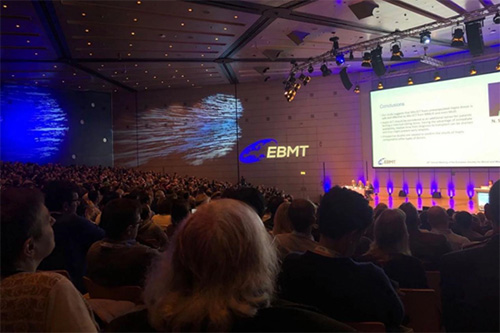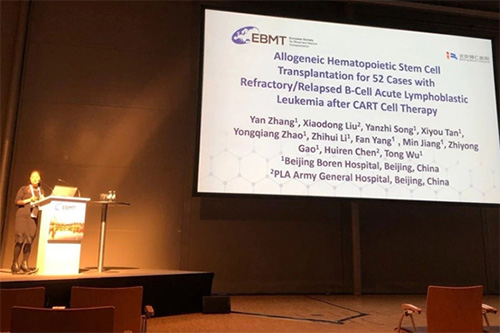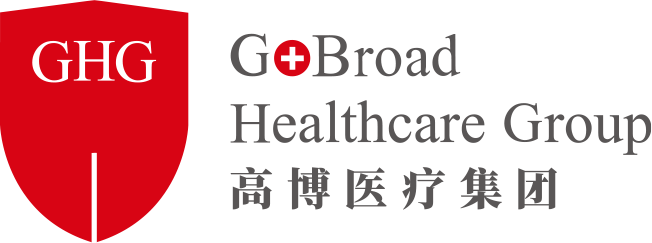EBMT Voice of China | Beijing Boren Hospital Appears at the 45th Annual Conference of the European Society for Blood and Marrow Transplantation with Distinction
(March 27, Frankfurt, Germany) The 45th Annual Conference of the European Society for Blood and Marrow Transplantation (EBMT 2019) is being held at the Congress Center Messe Frankfurt, and it is one of the largest annual academic events in the world blood and marrow transplantation. It attracts more than 5,000 international scholars from more than 80 countries and regions and discusses the most cutting-edge, the most representative and hottest topics in the world.
Beijing Boren Hospital appears at the EBMT 2019 with two keynote speeches. Director Shuangyou LIU's contribution on "Sequential CD19- and CD22-CART Therapies for Relapsed B-ALL after Transplantation" stood out from more than 1,000 abstracts worldwide and was selected as the top six outstanding clinical abstracts at the conference, and it was specially reported at the Presidential Symposium. Dr. Yan ZHANG's contribution on “Allogeneic Hematopoietic Stem Cell Transplantation for 52 Cases with Refractory/Relapsed B-Cell Acute Lymphoblastic Leukemia after CART Cell Therapy” was selected as an oral speech.
The conference was packed, and the speeches of the two teachers attracted wide attention and heated discussion among the participating experts. Director Shuangyou LIU was interviewed by many international media after the conference, and was invited to a TV interview by EBMT TV to show the world Boren's research results and clinical experience through the EBMT TV platform.
Presidential Symposium: Director Shuangyou LIU reported that sequential CD19- and CD22-CART therapies achieved a complete remission rate of 84.4% in the treatment of relapsed B-ALL after transplantation, and after a median of 10-month follow-up, the overall survival rate was 87.5% and the MRD-negative survival rate was 58.3%
Director Shuangyou LIU's On-site Report
As one of the top six outstanding clinical abstracts at the conference, Director Shuangyou LIU made a wonderful report at the Presidential Symposium with the title as: "Sequential CD19- and CD22-CART Cell Therapies for Relapsed B-Cell Acute Lymphoblastic Leukemia after Allogeneic Hematopoietic Stem Cell Transplantation: a median of 10-month follow up”.

The Main Venue Was Packed
This clinical study preliminarily showed that 84.4% of patients with relapsed B-ALL after Allo-HCT achieved CR one month after the first CART therapy, and another sequential CART therapy could significantly improve the long-term survival rate. In 24 patients followed up for a median of 10 months after sequential sequential CD19 and CD22 CART therapies, the overall survival (OS) and the MRD-negative leukemia-free survival (LFS) were 87.5% and 58.3%, respectively, and the median disease-free survival was 12.5 months. This is a breakthrough in comparison with the effects obtained from traditional treatment regimens.
Director Shuangyou LIU mentioned in the report that relapsed B-ALL after allo-HCT has very poor prognosis after traditional treatment, including discontinuation of immunosuppressive agents, chemotherapy, donor lymphocyte infusion (DLI) and interferons. CART cell therapy targeting CD19 has been proven to have significant efficacy on refractory/relapsed B-ALL (rrB-ALL), but single-target CART therapy may still lead to a high relapse rate, and it is difficult to maintain long-term remission. In recent years, CART therapy targeting CD22 has also shown good efficacy on rrB-ALL. Therefore, we used sequential CART therapies specifically targeting CD19 and CD22 to treat relapsed B-ALL after Allo-HCT, expecting to improve the long-term relapse-free survival rate.
From June 30, 2017 to October 31, 2018, a total of 32 patients who relapsed after Allo-HCT were included in the study. Their leukemia cells were confirmed by flow cytometry to simultaneously express CD19 and CD22 antigens; the median age of the patients was 22 years old (range: 2.3-55 years old); 21 patients had bone marrow relapse, 4 had only extramedullary relapse, and 7 had intramedullary and extramedullary relapse. Among them, 18 patients received other treatments, such as chemotherapy, DLI, interferons and even murine CD19-CART therapy. Of the 32 patients enrolled, 24 completed sequential CD19 and CD22 CART therapies and were followed up for observation, and the median follow-up time was 10 months (4.5-15 months).
Interview with Director Shuangyou LIU by EMBT TV
Oral report at the conference: Dr. Yan ZHANG reported that the 1-year disease-free survival rate was 73.0% in the study on “Allogeneic Hematopoietic Stem Cell Transplantation for 52 Cases with Refractory/Relapsed B-Cell Acute Lymphoblastic Leukemia after CART Cell Therapy”

Dr. Yan ZHANG's On-site Report
Dr. Yan ZHANG exhibited the results of “Allogeneic Hematopoietic Stem Cell Transplantation for 52 Cases with Refractory/Relapsed B-Cell Acute Lymphoblastic Leukemia after CART Cell Therapy” at this conference. Title of the report: “Allogeneic Hematopoietic Stem Cell Transplantation for 52 Cases with Refractory/Relapsed B-Cell Acute Lymphoblastic Leukemia after CART Cell Therapy”. Dr. Yan ZHANG exhibited the results of “Allogeneic Hematopoietic Stem Cell Transplantation for 52 Cases with Refractory/Relapsed B-Cell Acute Lymphoblastic Leukemia after CART Cell Therapy” at this conference. Title of the report: “Allogeneic Hematopoietic Stem Cell Transplantation for 52 Cases with Refractory/Relapsed B-Cell Acute Lymphoblastic Leukemia after CART Cell Therapy”.
In the report, Dr. Yan ZHANG introduced that CD19-CART cell therapy showed good efficacy on refractory/relapsed B-ALL. However, there are still different opinions on whether Allo-HCT should be performed after CART therapy to achieve persistent CR. Some studies have shown that if bridging transplantation is not performed when CR is achieved after CD19-CART therapy, some patients will develop CD19-negative relapse within 3-6 months; while a study has shown that the 6-month overall survival rate is similar in patients undergone or not undergone Allo-HCT after CART therapy (79% vs. 80%). Therefore, we analyzed the results of bridging Allo-HCT in 52 patients with refractory/relapsed B-ALL who achieved CR or CRi after CART therapy from August 2017 to November 2018, to evaluate the overall survival and leukemia-free survival of bridging transplantation after CART therapy.
The median age of the patients was 6 (1-42) years old, and 22 patients (42.3%) had poor prognosis, manifested as abnormal cytogenetic or molecular level, including 6 cases of TP53 mutation/deletion, 5 cases of BCR-ABL1, 2 cases of MLL-AF4, 5 cases of E2A-PBX1, 1 case of E2A-HLF, 1 case of iAMP21, 1 case of complex karyotype and 1 case of chromosome monomer karyotype. These patients underwent Allo-HCT when CR/CRi was achieved after CART cell therapy, and the median time from back infusion of CART cells to Allo-HCT was 50 (34-98) days. Most patients (n=40, 76.9%) underwent related haploidentical transplantation. Graft-versus-host disease (GVHD) and infection were prevented routinely after transplantation.
Results: The median follow-up time was 326 (41-479) days, and 46/52 of patients survived. Nine patients (17.3%) relapsed after transplantation, 4 of whom died due to relapse, and the other 5 achieved CR again after receiving another CART therapy. The 1-year overall survival rate was 87.7% (95% CI = 72.8%-94.7%), and the 1-year leukemia-free survival rate was 73% (95% CI = 53.0%-85.6%). Dr. Yan ZHANG concluded that rapid bridging Allo-HCT and the adopted optimized haploidentical transplantation protocol after CR was achieved by CART therapy were the key factors for good efficacy of transplantation, and long-term follow-up was needed to observe the long-term efficacy.
After reporting the overall study data, Dr. Yan ZHANG shared a typical case with the participants. A 25-year-old female patient was diagnosed with B-ALL in February 2014 and relapsed in September 2017, 70% of bone marrow cells were leukemia cells, with complex karyotypes, and re-induction chemotherapy was ineffective. On November 20, 2017, the patient received CD22-CART therapy, the disease was evaluated as CR at 15 and 30 days after treatment, and residual leukemia was not detected. On January 17, 2018, myeloablative pretreatment was given; on January 29-30, the sister haploidentical transplantation was performed, the hematopoietic reconstitution was successful, and no GVHD and infection occurred after transplantation; currently, the disease-free survival reached 14 months. CART enabled patients with B-ALL who had no response to chemotherapy to achieve MRD-negative high-quality CR, thus significantly improved the disease-free survival rate after Allo-HCT.
With the achievement in these two studies, Director Shuangyou LIU and Dr. Yan ZHANG presented the results at the 60th Annual Conference of the American Society of Hematology (ASH) in 2018 and the 23rd Annual Conference of the Asia-Pacific Blood and Marrow Transplantation (APBMT) in 2018, respectively, which attracted the great attention of the academic community. At the EBMT conference, they updated the results of the above two clinical studies, included more cases, extended the follow-up time, adopted new treatment strategies and significantly improved the disease-free survival of patients with refractory/relapsed B-ALL. Beijing Boren Hospital always adheres to the all-round development of clinical and scientific research and leads the hospital development with academic spirit. Beijing Boren Hospital is characterized by integrated medicine, cellular immunotherapy, targeted therapy, hematopoietic stem cell transplantation and accurate diagnosis, constantly explores new technologies and methods to maximize the therapeutic effect, and brings hopes to many patients with blood diseases.
Founded in 1974, the European Society for Blood and Marrow Transplantation (EBMT) covers more than 700 hospitals and research institutions in more than 60 countries and regions, and it is currently one of the major transplantation collaboration organizations in the world. The annual conference of the EMBT provides a mainstream platform for scientists and physicians in the field of clinical hematopoietic stem cell transplantation to share cutting-edge progresses and exchange new research results.
Request an Appointment
Whether you are ready to make an appointment now or have questions for our expert team, we are standing by to help.
Email: international.service@gobroadhealthcare.com Phone: +86 010-83605002/010-83605200 Online Access
















